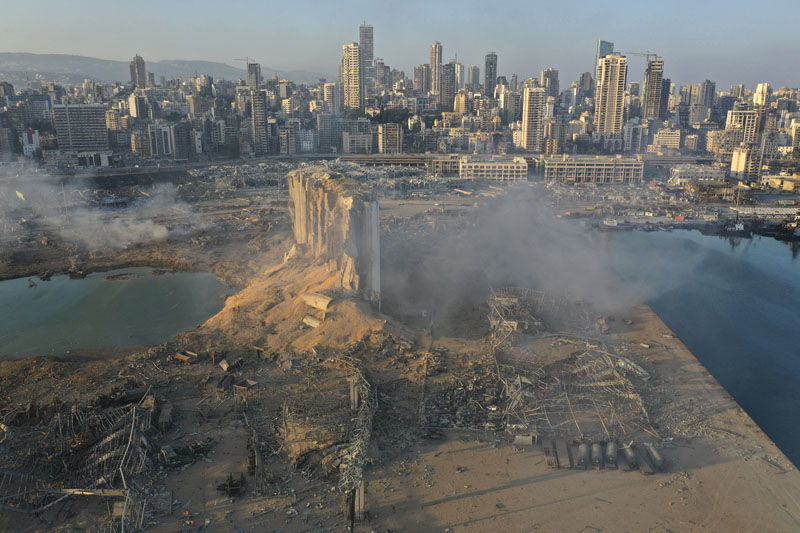Donors pledge 253 mln euros in emergency aid for Lebanon after blast
- Macron says emergency aid must come quickly
- Aug 4 port blast killed 158 people, more than 6,000 hurt
- Explosion puts pressure on heavily indebted economy
- Many Lebanese blame a corrupt political elite
FORT BREGANCON: An emergency donor conference on Sunday for blast-stricken Lebanon raised pledges worth nearly 253 million euros ($298 million) for immediate humanitarian relief, the French presidency said.
Those commitments would not be conditional on political or institutional reform, President Emmanuel Macron's office said. There were also pledges made for longer-term support that would depend on changes brought in by the authorities, the Elysee Palace said.
World powers promised not to fail the Lebanese people as the capital, Beirut, recovers from the massive explosion that killed 158 people and destroyed swathes of the city last Tuesday. Lebanon was already mired in political and financial crisis before the blast.
But foreign countries demanded transparency over how the aid is used, wary of writing blank cheques to a government viewed by its own people as deeply corrupt. Some are concerned about the influence of Iran through the Shi'ite group Hezbollah.
The "assistance should be timely, sufficient and consistent with the needs of the Lebanese people ... and directly delivered to the Lebanese population, with utmost efficiency and transparency," the final communique stated.
Macron, who visited Beirut on Thursday, hosted the conference by video-link and in his opening remarks urged participating nations to put aside their differences and support the Lebanese people.
The international response should be coordinated by the United Nations in Lebanon, he added.
The offer of assistance included support for an impartial, credible and independent inquiry into the blast. Public anger over the explosion has prompted some Lebanese to call for a revolt to topple their political leaders.
"Our role is to be by their side," Macron said from his summer retreat on the French Riviera.
REFORMS
President Donald Trump told the conference the United States was ready to continue providing aid to help the Lebanese, the White House said.
"The President called for calm in Lebanon and acknowledged the legitimate calls of peaceful protesters for transparency, reform and accountability," a White House statement said.
Trump later said the United States would send additional planes loaded with medical supplies, food and water and would give substantial aid to Lebanon, though he declined to give a dollar figure.
"We haven't given a number, but it will be substantial. On a humanitarian basis, we have to do it," Trump told reporters in Morristown, New Jersey.
The International Monetary Fund said it was willing to redouble efforts to help Lebanon after the devastating blast, but said all of the country's institutions needed to show willingness to carry out reforms.
In a statement to the conference, the IMF's managing director, Kristalina Georgieva, laid out reforms expected, including steps to restore the solvency of public finances and the soundness of the financial system, and temporary safeguards to avoid continued capital outflows.
The explosion gutted entire neighbourhoods, leaving 250,000 people homeless, razing businesses and destroying critical grain supplies.
Rebuilding Beirut will likely run into the billions of dollars. Economists forecast the blast could wipe up to 25% off of the country's GDP.
Up to Sunday's conference there had been an array of offers of immediate humanitarian support such as rescue teams and medical supplies.
In a sign of the mistrust between Beirut and donors before the blast, debt default talks between the Lebanese government and International Monetary Fund had stalled in the absence of reforms.
The communique said Lebanon's partners were ready to support the country's longer-term economic recovery if leaders committed fully to the changes expected by the Lebanese.
Many Lebanese say the blast, blamed on a huge store of ammonium nitrate, highlighted the negligence of a corrupt political elite. Protesters stormed government ministries in Beirut on Saturday and demonstrations erupted again on Sunday.






